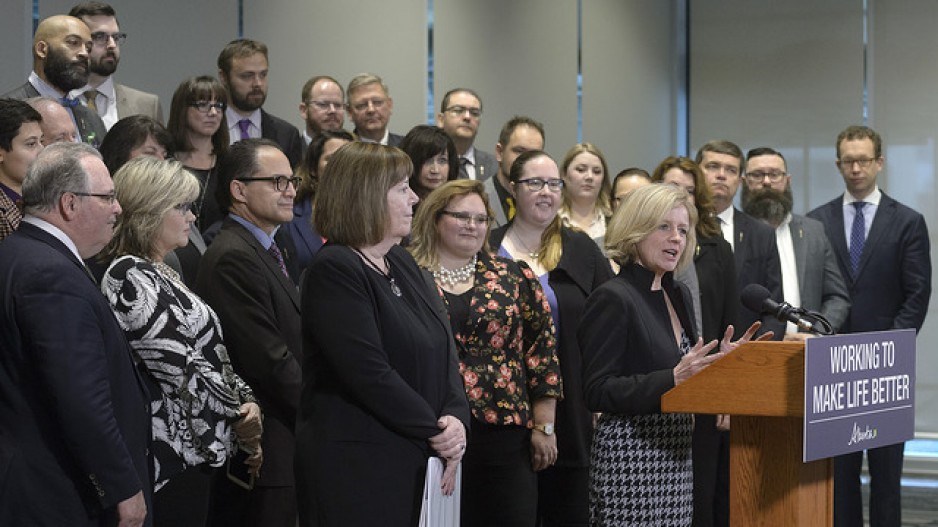The B.C. government may need an emergency backup plan to provide alternative sources of gasoline, diesel and jet fuel for British Columbians, should Kinder Morgan Canada (TSX:KML) decide to cancel the Trans Mountain pipeline expansion project.
Alberta introduced a new bill Monday April 16 that will give its energy minister sweeping powers to restrict exports of oil, natural gas and refined fuel products (gasoline and diesel).
And should the Trans Mountain pipeline project be cancelled, Alberta Premier Rachel Notley said that might be an appropriate time to exercise the new powers.
"If what we are seeing is that, by May 31, there is huge investor uncertainty created by the fact that there is not a future expectation of significantly increased pipeline capacity, then that might be the point at which we're going to have to be a lot more strategic around what products get shipped to what markets, by what means," Notley said.
The new legislation, Bill 12, is in response to B.C.’s opposition to the $7.4 billion Trans Mountain pipeline expansion, but could be used in the future in disputes with other provinces.
Quebec, for example, put up similar resistance to the Energy East pipeline that B.C. has put up for Trans Mountain, and just recently sided with B.C. in its fight with Ottawa over jurisdictional issues.
If Bill 12 passes in the Alberta legislature, it would require all companies in Alberta to obtain a licence before it could export oil, natural gas or refined petroleum products.
The bill gives the minister of energy the authority to decide if an export is in Alberta’s interest. The minister would be able to issue orders to a company to cease exporting oil, gas or refined fuels.
Ironically, should Alberta exercise its authority under Bill 12, it could result in the very thing that B.C. Premier John Horgan is trying to prevent – increased shipments of diluted bitumen from Alberta by pipeline – with the added problem of increased gasoline prices.
The existing Trans Mountain pipeline is a multi-purpose line that is used to move a variety of crude oils and refined fuels. Notley hinted that her government could decide to allow more diluted bitumen to flow on the pipeline, which might displace the refined fuels that move on that line.
“We might determine that, because we don’t have enough capacity for bitumen, which is one of the things for which there is great demand right now, that we need to use as much pipeline capacity for bitumen,” Notley said. “And then it may well be that the smaller refined exports goes on rail. And it is true that going on rail may, inadvertently, impact the price that people for at the other end of the train track.”
Asked what such a shift would mean, Dan McTeague, a petroleum analyst with Gasbuddy, said: "Sixty per cent would be displaced. That’s going to leave a mark."
While new developments announced on Sunday have given Notley confidence that the Trans Mountain expansion will go ahead, there is no guarantee that will happen.
“This legislation will be there, if Alberta needs it," Notley said. "I remain confident that we will not have to use it, but I am also making sure that we are ready with every tool at our disposal.”
While Alberta fully expects the law could be challenged for its constitutionality, it would have its intended effect – inflicting pain on B.C. – for a considerable amount of time before there was ever a ruling.
“Nobody can really say if the legislation leads to anything unconstitutional until they see how it's applied,” said Dwight Newman, a constitutional law expert at the University of Saskatchewan.
“The legislation is cleverly framed to not say much on how the export licence system will actually operate and to maintain enormous discretion in the hands of Alberta's government. The result is it could be applied in ways that are entirely constitutional.”
On Sunday, following an emergency summit between Prime Minister Trudeau, Notley and Horgan, it was announced that both Alberta and the federal government are in discussion with Kinder Morgan on a plan to take a public position in the project to reduce risk to Kinder Morgan shareholders, should the project continue to suffer delays. Trudeau also announced his government will introduce new legislation that will assert the federal government's authority over the Trans Mountain project.
Kinder Morgan Canada (TSX:KML) has given the federal government until May 31 to provide the "clarity" in needs to proceed, and has warned it may pull the plug on the project.
Alberta supplies 90% of British Columbia’s gasoline and diesel, according to the National Energy Board, via the Trans Mountain pipeline, either in the form of oil, which is refined in Burnaby, or in refined petroleum products. The rest comes in from refineries in the Pacific Northwest states, mainly Washington.
Approximately 80,000 barrels a day of refined fuels goes to B.C. via pipeline, rail and truck. B.C.’s only refineries are the Parkland Fuels refinery in Burnaby and a small refinery in Prince George. Combined, they produce 70,000 barrels per day of gasoline, diesel and jet fuel




